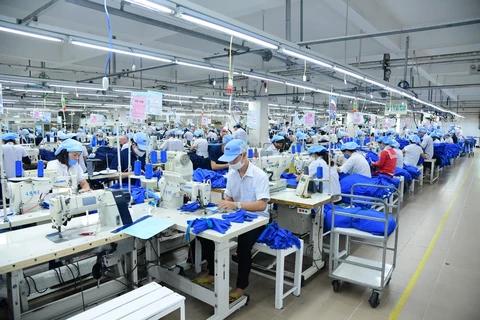Hanoi (VNA) - Singapore-headquartered United Overseas Bank (UOB) has maintained its growth forecast for Vietnam at 6% this year.
Brighter prospects
UOB experts gave an optimistic view on the prospect of improving GDP growth in 2024. Vietnam posted an expansion of 5.05% in 2023 that was weighed down by weak external demand and a high base in the prior year. This year, the road remains bumpy with downside risks due to the uncertainties and risks arising from the ongoing conflicts elsewhere in the world, geopolitical contestations among major powers, and an environment of high interest rates.
The conflict around the Red Sea areas, which account for 12% of global trade with 17,000 ships sailing through annually, has forced global shipping companies to re-route around the Cape of Good Hope, thus lengthening the journeys, causing shipment delays, higher delivery costs and disruptions to the shipping network.
“This would hurt not just the end consumers and users, but exporters, manufacturers and supply chains worldwide, including Vietnam, as orders would be impacted by delays and higher costs, and thus production,” it said in a note released on January 29.
According to UOB, another factor to consider is the implementation of global minimum tax (GMT) in Vietnam on multinational enterprises (MNEs), effective from January 1.
It is estimated that 122 foreign companies will be affected by the change, with an annual tax revenue uplift of 14.6 trillion VND (601 million USD) to the State. The more important issue is that various tax incentives such as preferential tax rate, tax holidays, among others granted to MNEs have helped to reduce the corporate tax rate to 20%.
With the current change, foreign investors, especially MNEs, will need to take into account higher tax costs in their future planning. It would be critical that measures be implemented to offset the GMT, such as reduction of costs and raising labour productivity, in order to preserve the competitiveness of Vietnam as an investment destination. Nonetheless, Vietnam’s prospects are bolstered by the recovery in the semiconductor cycle, stable growth in China and the region, as well as supply chain shifts that are largely in favour of Vietnam and other countries of the Association of Southeast Asian Nations (ASEAN).
Inflation pressures are anticipated to remain on the upside, with a forecast for the consumer price index (CPI) to stay elevated at 3.7% in 2024, from 3.25% in 2023, UOB experts said.
SBV to hold rates steady for now
Regarding monetary policy, UOB experts assessed that the State Bank of Vietnam (SBV) responded swiftly in early 2023 to the economic slowdown and challenges with rapid successive interest rate cuts. The last policy rate reduction took place in June 2023 when it lowered its refinancing rate by a cumulative 150bps, to 4.5%. However, with the pace of economic activities on the mend and better prospects in 2024, the possibility of further rate cuts has diminished. As such, UOB believed that SBV will maintain its refinancing rate at the current level of 4.5% for now.
 UOB believes that SBV will maintain its refinancing rate at current level of 4.5%. (Photo: VietnamPlus)
UOB believes that SBV will maintain its refinancing rate at current level of 4.5%. (Photo: VietnamPlus) The revision of the Law on Credit Institutions, which will take effect from July 1, creates a framework for special loans from the SBV, including zero-interest loans and collateral-free loans, which can be directed towards specific policy goals to allow for support of key sectors and to deploy emergency liquidity as needed, such as bank runs. This reflects the government's commitment and means to supporting key sectors and responding to emergencies.
In 2023, bank lending rose 13.5% year-on-year, marginally short of the 14-15% target set for the year, as the regulator told banks to simplify lending procedures and improve businesses’ access to bank loans. For 2024, the SBV aims to boost loan growth to about 15% with the flexibility to adjust based on economic developments throughout the year./.
























